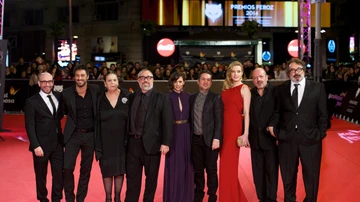Every year, the months of January and February are in which in Spain and in many other places the red carpets roll out to make way for the award ceremonies. Golden Globes, Goya Awards, BAFTA… and for some years, also the Fierce Awards. For a few years, not many, because in 2023 this ceremony will be ten years old.
The anniversary of the Feroz “comes to be the affirmation of some prizes that nobody expected, nor believed that they were needed“; however, “they have opened our eyes to new creations and have put artists like Los Javis (Javier Ambrossi and Javier Calvo) on the map, who are a bit of a metaphor for our own existence.” This is a consideration of María Guerra , president of the Association of Film Informants of Spain (AICE), the entity that grants these awards for the best Spanish cinema of the yearand since 2016, also to television series, this year, with a new award for best series script, and with Pedro Almodóvar as godfather and Honor Award.
Guerra, re-elected in 2022 for a second term, assures that she maintains “the torch of foolishness and daring” of the first Feroz y trusts to keep “the defiant gaze” with which the association was born. Ten years ago, Spanish journalists specialized in cinema —series had not yet come to the fore with the current momentum— saw problems and shortcomings in the way in which the cinematographic information machinery worked, imbalances that caused, each time more often, a discomfort that is difficult to explain.
It was 2013 and a group of young reporters, colleagues and friends who had started working in different media at the same time did not quite fit the fact that the “mainstream” media looked down on, even, with superiority, to those who reported from digital media. “David Carrón, Pedro Vallín, Laura Seoane, Pablo López, David Martos and others were a generational replacement that had suddenly arrived in a profession that resisted change and in which we had to elbow our way into it,” he told EFE. Fernando de Luis-Orueta, founder of the IAEC and then director of a digital medium.

many talks and many stolen moments from sleep at film festivals afterwards, the group took the “leap into the void”. “When the journalistic world was turning completely, they broke into the festivals and began to question the traditional criteria and the privileges of the press. But, what press? Was there only one press with credibility?”, points out María Guerra . The IAEC, considers the veteran journalist, director of La Script, “appeared at a time when digital was changing everything, and even then I thought his bravery was amazing and that arrogance that for me has been very refreshing”.
Carrón —then a cultural journalist at La Razón— assumed the first presidency and later Vallín —Culture editor at La Vanguardia— was elected to the position in the first elections, already with 180 members (now close to three hundred). And as a flagship, the Feroz Awards. But creating prizes out of nothing was not easy, much less at a time when Goya themselves had financial difficulties. “At that time, Gas Natural sponsored film activities and we convinced them for the first push, but they did not put up enough money to produce the gala, so we did it by taking vacations in our media,” explains Fernando de Luis-Orueta. And also they assumed debtseven personal.
The first Feroz gala was “Hollywood”
The employment situation of some members of the team —and the multiple praise for that first gala, which was a complete success— pushed them to reconcile their journalistic profession with the production of events: La Tropa Produce was born, today a consolidated company that continues to take care of the Feroz, among many other activities.
“That was ‘Hollywood’, we managed to do it on Gran Vía, in the Callao cinema —we raised all the seats for the first time—, and the City Council let us occupy the entire square. The thing was so so fat, remembers for EFE David Carrón, that Álex de la Iglesia, former president of the Academy, told me: ‘You are bastards because you have achieved what you I did not succeed with the Goya‘, and that it was an outdoor red carpet in Madrid, because he had to put it in a tent when they were made at the Teatro Real”.
Today, the president is aware of the “biggest problem” of the association: “Precariousness, which is also invisible, not only for citizens but for the industry itself”, and which causes “the appearance of a ‘fan’ journalism,” Guerra defines it, “which moves in a very diffuse territory as soon as to credibility”.
“You have to be critical, but the journalist has to have money to eat“, warns the president of the informants, who will undoubtedly address the issue in her emblematic speech at the Spanish “Golden Globes” party, which return to Zaragoza
Source: Lasexta
Bruce is a talented author and journalist with a passion for entertainment . He currently works as a writer at the 247 News Agency, where he has established himself as a respected voice in the industry.












